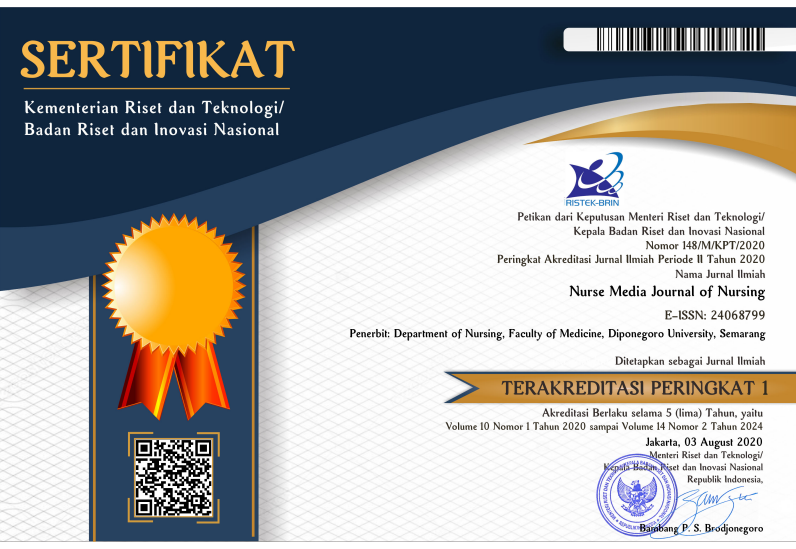Development of a Home-Based Holistic Dementia Nursing Intervention Model for Family Caregivers
Keywords:
Dementia, family caregiver, holistic, home-based, intervention, model developmentAbstract
Background: The number of older adults with dementia in Indonesia continues to increase. However, many family caregivers still have limited knowledge and skills, leading to adverse effects on both the older adults and the caregivers themselves. Existing interventions mainly focus on single aspects of care and have not adequately addressed the physical, psychological, social, and spiritual dimensions. Therefore, there is a need for a comprehensive intervention model that holistically meets caregivers’ needs.
Purpose: This study aimed to develop a home-based holistic dementia nursing intervention model for family caregivers and identify its key features.
Methods: Three approaches were used for model development: (1) literature review, (2) in-depth interviews, and (3) expert validation. Five articles addressing holistic care dimensions and nursing interventions were included in the review. Fifteen participants took part in the in-depth interviews, while expert validation involved three specialists in the geriatric field with specific qualifications. Data were collected between August and September 2022. Analysis was conducted by comparing and synthesizing the findings from the literature review, interviews, and expert validation.
Results: The holistic dementia nursing intervention model for family caregivers consisted of four intervention domains: (1) physical, (2) psychological, (3) social, and (4) spiritual. The model also incorporated three key components: (1) communication processes, (2) organizational processes, and (3) belief systems.
Conclusion: The home-based holistic dementia nursing intervention model for family caregivers offers a potential conceptual framework to comprehensively address the physical, psychological, social, and spiritual needs of both older adults and their caregivers.
Downloads
References
1. Acton, G. J., & Miller, E. W. (2003). Spirituality in Caregivers of Family Members with Dementia. Journal of Holistic Nursing, 21(2), 117–130. https://doi.org/10.1177/0898010103021002003
2. Birkenhäger-Gillesse, E. G., Achterberg, W. P., Janus, S. I. M., Zuidema, B. J. K., & U., S. (2020). Effects of caregiver dementia training in caregiver-patient dyads. In International Journal of Geriatric Psychiatry (Vol. 35, Issue 11, p. 1424). https://doi.org/10.1002/gps.5378
3. Brown-Baaitjies, O., Fouch, P., & Greeff, A. (2008). The development and relevance of the Resiliency Model of Family Stress , Adjustment and Adaptation. Acta Academia, 40(1), 78–126
4. Campbell, S., Greenwood, M., Prior, S., Shearer, T., Walkem, K., Young, S., Bywaters, D., & Walker, K. (2020). Purposive sampling: complex or simple? Research case examples. Journal of Research in Nursing, 25(8), 652–661. https://doi.org/10.1177/1744987120927206
5. Cheng, S. T., Au, A., Losada, A., Thompson, L. W., & Gallagher-Thompson, D. (2019). Psychological Interventions for Dementia Caregivers: What We Have Achieved, What We Have Learned. Current Psychiatry Reports, 21(7). https://doi.org/10.1007/s11920-019-1045-9
6. Colaizzi, P. F. (1978). Psychological research as the phenomenologist views it. In Existential phenomenological alternatives for psychology. In R. S. Vaile & M. King (Eds.), Existential phenomenological alternatives for psychology. Oxford University Press
7. Colvin, A. D., & Bullock, A. N. (2016). A review of the biopsychosocial aspects of caregiving for aging family members. Journal of Family Social Work, 19(5), 420–442. https://doi.org/10.1080/10522158.2016.1214657
8. Cristancho-Lacroix, V., Wrobel, J., Cantegreil-Kallen, I., Dub, T., Rouquette, A., & Rigaud, A. S. (2015). A Web-based psychoeducational program for informal caregivers of patients with Alzheimer’s disease: A pilot randomized controlled trial. Journal of Medical Internet Research, 17(5), 1–15. https://doi.org/10.2196/jmir.3717
9. Dossey, B. M., Keegan, L., & Guzzetta, C. F. (2005). Holistic Nursing A Handbook for Practice (4th edition). In Nursing Education Perspectives (Vol. 27, Issue 2)
10. Drury, C., & Hunter, J. (2016). The Hole in Holistic Patient Care. Open Journal of Nursing, 06(09), 776–792. https://doi.org/10.4236/ojn.2016.69078
11. Ducharme, F., Dubé, V., Lévesque, L., Saulnier, D., & Giroux, F. (2011). An online stress management training program as a supportive nursing intervention for family caregivers of an elderly person. Canadian Nursing Informatics Journal, 6(2), 1–26
12. Dwidiyanti, M., Kp, S., & Sc, M. (2018). Konsep Mindfulness Spiritual. 1–5
13. Fernández-Calvo, B., Castillo, I. C., Campos, F. R., e Carvalho, V. M. de L., da Silva, J. C., & Torro-Alves, N. (2016). Resilience in caregivers of persons with Alzheimer’s disease: A human condition to overcome caregiver vulnerability. Estudos de Psicologia, 21(2), 125–133. https://doi.org/10.5935/1678-4669.20160013
14. Guerra, M., Ferri, C. P., Fonseca, M., Banerjee, S., & Prince, M. (2010). Helping carers to care: the 10/66 dementia research group’s randomized control trial of a caregiver intervention in Peru. Revista Brasileira de Psiquiatria, 33(1), 47–54. https://doi.org/10.1590/s1516-44462010005000017
15. Hamid, A. Y. S., Chandra, Y. A., Putri, A. F., Wakhid, A., Falahaini, A., & Yulianingsih, Y. (2023). Sustainable disaster risk reduction training model for nurses: A descriptive qualitative approach. Nurse Education in Practice, 69(November 2022), 103616. https://doi.org/10.1016/j.nepr.2023.103616
16. Hennink, M., & Kaiser, B. N. (2022). Sample sizes for saturation in qualitative research: A systematic review of empirical tests. Social Science and Medicine, 292, 114523. https://doi.org/10.1016/j.socscimed.2021.114523
17. Hoppes, S., Bryce, H., Hellman, C., Finlay, E., Hoppes, S., Bryce, H., Hellman, C., Finlay, E., Effects, T., Hoppes, S., & Bryce, H. (2012). The Effects of Brief Mindfulness Training on Caregivers ’ Well-Being on Caregivers ’ Well-Being. 4788. https://doi.org/10.1080/01924788.2012.673154
18. Jacobvitz, D., Curran, M., & Moller, N. (2002). CONDUCTING IN-DEPTH INTERVIEWS: A Guide for Designing and Conducting In-Depth Interviews for Evaluation Input. Attachment and Human Development, 4(2), 207–215. https://doi.org/10.1080/14616730210154225
19. Jasemi, M., Valizadeh, L., Zamanzadeh, V., & Keogh, B. (2017). A concept analysis of holistic care by hybrid model. Indian Journal of Palliative Care, 23(1), 71–80. https://doi.org/10.4103/0973-1075.197960
20. Kevern, P., & Stifoss-Hanssen, H. (2020). The challenges of dementia care and the (un)making of meaning: Analysis of an online forum on carer spirituality. Dementia, 19(4), 1220–1236. https://doi.org/10.1177/1471301218797248
21. King, I. M. (1992). King’s Theory of Goal Attainment. Nursing Science Quarterly, 5(1), 19–26. https://doi.org/10.1177/089431849200500107
22. Laakkonen, M. L., Kautiainen, H., Hölttä, E., Savikko, N., Tilvis, R. S., Strandberg, T. E., & Pitkälä, K. H. (2016). Effects of Self-Management Groups for People with Dementia and Their Spouses - Randomized Controlled Trial. Journal of the American Geriatrics Society, 64(4), 752–760. https://doi.org/10.1111/jgs.14055
23. Lauritzen, J., Bjerrum, M. B., Pedersen, P. U., & Sørensen, E. E. (2019). Support groups for carers of a person with dementia who lives at home: A focused ethnographic study. Journal of Advanced Nursing, 75(11), 2934–2942. https://doi.org/10.1111/jan.14151
24. Martínez-Santos, A. E., Vicho de la Fuente, N., Facal, D., Vilanova-Trillo, L., Gandoy-Crego, M., & Rodríguez-González, R. (2021). Care tasks and impact of caring in primary family caregivers: A cross-sectional study from a nursing perspective. Applied Nursing Research, 62. https://doi.org/10.1016/j.apnr.2021.151505
25. McEvoy, L., & Duffy, A. (2008). Holistic practice - A concept analysis. Nurse Education in Practice, 8(6), 412–419. https://doi.org/10.1016/j.nepr.2008.02.002
26. Meichsner, F., Töpfer, N. F., Reder, M., Soellner, R., & Wilz, G. (2019). Telephone-Based Cognitive Behavioral Intervention Improves Dementia Caregivers’ Quality of Life. American Journal of Alzheimer’s Disease and Other Dementias, 34(4), 236–246. https://doi.org/10.1177/1533317518822100
27. Page, M. J., McKenzie, J. E., Bossuyt, P. M., Boutron, I., Hoffmann, T. C., Mulrow, C. D., Shamseer, L., Tetzlaff, J. M., Akl, E. A., Brennan, S. E., Chou, R., Glanville, J., Grimshaw, J. M., Hróbjartsson, A., Lalu, M. M., Li, T., Loder, E. W., Mayo-Wilson, E., McDonald, S., … Moher, D. (2021). The PRISMA 2020 statement: An updated guideline for reporting systematic reviews. The BMJ, 372. https://doi.org/10.1136/bmj.n71
28. Palacio G, C., Krikorian, A., Gómez-Romero, M. J., & Limonero, J. T. (2020). Resilience in Caregivers: A Systematic Review. American Journal of Hospice and Palliative Medicine, 37(8), 648–658. https://doi.org/10.1177/1049909119893977
29. Papathanasiou, I. (2013). Holistic Nursing Care: Theories and Perspectives. American Journal of Nursing Science, 2(1), 1. https://doi.org/10.11648/j.ajns.20130201.11
30. Pleasant, M. L., Molinari, V., Hobday, J. V., Fazio, S., Cullen, N., & Hyer, K. (2017). An evaluation of the CARES® Dementia Basics Program among caregivers. International Psychogeriatrics, 29(1), 45–56. https://doi.org/10.1017/S1041610216001526
31. Pleasant, M., Molinari, V., Dobbs, D., Meng, H., & Hyer, K. (2020). Effectiveness of online dementia caregivers training programs: A systematic review. Geriatric Nursing, 41(6), 921–935. https://doi.org/10.1016/j.gerinurse.2020.07.004
32. Polit, D. F., & Beck, C. T. (2014). Essentials of Nursing Research Seventh Edition Appraising Evidence for Nursing Practice. In Lippincott Williams & Wilkins
33. Salbiah. (2006). Konsep Holistik Dalam Keperawatan Melalui Pendekatan Model Adaptasi Sister Callista Roy. Jurnal Keperawatan Rufaidah Sumatera Utara, 2(1), 34–38
34. Sitges-Maciá, E., Bonete-López, B., Sánchez-Cabaco, A., & Oltra-Cucarella, J. (2021). Effects of e-health training and social support interventions for informal caregivers of people with dementia—a narrative review. International Journal of Environmental Research and Public Health, 18(15). https://doi.org/10.3390/ijerph18157728
35. Stjernswärd, S., & Hansson, L. (2017). Effectiveness and Usability of a Web-Based Mindfulness Intervention for Families Living with Mental Illness. Mindfulness, 8(3), 751–764. https://doi.org/10.1007/s12671-016-0653-2
36. Tkatch, R., Bazarko, D., Musich, S., Wu, L., MacLeod, S., Keown, K., Hawkins, K., & Wicker, E. (2017). A Pilot Online Mindfulness Intervention to Decrease Caregiver Burden and Improve Psychological Well-Being. Journal of Evidence-Based Complementary and Alternative Medicine, 22(4), 736–743. https://doi.org/10.1177/2156587217737204
37. Tong, A., Sainsbury, P., & Craig, J. (2007). Consolidated criteria for reporting qualitative research (COREQ): A 32-item checklist for interviews and focus groups. International Journal for Quality in Health Care, 19(6), 349–357. https://doi.org/10.1093/intqhc/mzm042
38. Walsh, F. (2016). Family resilience: a developmental systems framework. European Journal of Developmental Psychology, 13(3), 313–324. https://doi.org/10.1080/17405629.2016.1154035
39. Widyastuti, R. H., Sahar, J., Rekawati, E., & Kekalih, A. (2023). Barriers and Support for Family Caregivers in Caring for Older Adults with Dementia: A Qualitative Study in Indonesia. Nurse Media Journal of Nursing, 13(2), 188–201. https://doi.org/10.14710/nmjn.v13i2.55729
40. Wiegelmann, H., Speller, S., Verhaert, L. M., Schirra-Weirich, L., & Wolf-Ostermann, K. (2021). Psychosocial interventions to support the mental health of informal caregivers of persons living with dementia – a systematic literature review. BMC Geriatrics, 21(1), 1–17. https://doi.org/10.1186/s12877-021-02020-4
41. Zafeiridi, P., Paulson, K., Dunn, R., Wolverson, E., White, C., Thorpe, J. A., Antomarini, M., Cesaroni, F., Scocchera, F., Landrin-Dutot, I., Malherbe, L., Lingiah, H., Berard, M., Girones, X., Quintana, M., Cortes, U., Barrue, C., Cortes, A., Paliokas, I., … Tzovaras, D. (2018). A Web-Based Platform for People with Memory Problems and Their Caregivers (CAREGIVERSPRO-MMD):Mixed-Methods Evaluation of Usability. JMIR Formative Research, 2(1), 1–12. https://doi.org/10.2196/formative.9083
42. Zhao, Y., Feng, H., Hu, M., Hu, H., Li, H., Ning, H., Chen, H., Liao, L., & Peng, L. (2019). Web-based interventions to improve mental health in home caregivers of people with dementia: Meta-analysis. Journal of Medical Internet Research, 21(5), 1–11. https://doi.org/10.2196/13415
43. Zhou, Y., Ishado, E., O’Hara, A., Borson, S., & Sadak, T. (2021). Developing a Unifying Model of Resilience in Dementia Caregiving: A Scoping Review and Content Analysis. Journal of Applied Gerontology, 40(10), 1377–1388. https://doi.org/10.1177/0733464820923549






